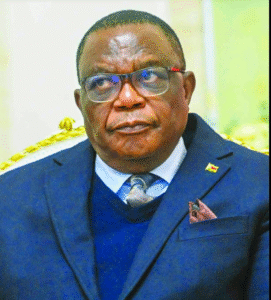WHO STOLE ZIMBABWE’S GOLD? THE MYSTERY THAT MUST BE UNLOCKED
Zimbabwe is now in the middle of a gold scandal that could go down as one of the biggest heists in the country’s history. According to Zanu PF spokesperson Chris Mutsvangwa, gold reserves were sent to a Middle Eastern country in a desperate move to get US dollars—but Zimbabwe never got paid. The gold is gone, and no money came back. This is not just a financial scandal—it is a national crisis.

Mutsvangwa dropped the shocking news at a press conference held at the Zanu PF headquarters in Harare. He admitted that Zimbabwe, under extreme pressure from Western sanctions, sold its gold to get cash. But there was no payment. The gold was shipped out and vanished. Zimbabwe, already struggling, was robbed in broad daylight.
This scandal is believed to have happened during the rule of the late Robert Mugabe. Mutsvangwa did not name anyone, but he suggested that the Reserve Bank of Zimbabwe (RBZ) was involved. That points to several former RBZ governors who were in charge between 2002 and now—people like Leonard Tsumba, Gideon Gono, and John Mangudya. Finance ministers during that time, such as Simba Makoni and Patrick Chinamasa, were also supposed to oversee central bank operations. The question is: who exactly authorized this deal?
If gold was sent and no payment came back, the Zimbabwean people deserve answers. The secrecy surrounding the names and the country involved is making things worse. Mutsvangwa’s refusal to reveal full details is protecting those who may have committed this crime against the state. His call for silence does not help Zimbabwe. It only delays justice and lets looters walk free.
What’s worse, this is not just a local matter. The deal involved an Arab country, according to Mutsvangwa. That makes it international. If a foreign government or private company took Zimbabwe’s gold and failed to pay, that country must be named. Leaders from that country must be questioned. The people of Zimbabwe must know who benefited from their national wealth.
Zimbabwe’s economy is in tatters. Inflation is high. Unemployment is a crisis. Hospitals are broken. Roads are collapsing. Schools are struggling. That gold could have helped. Instead, it was taken and lost. The betrayal is deep.
This scandal also shows why Zimbabwe needs transparency. Too many deals are made behind closed doors. Too many leaders act in secrecy. The people are left in the dark, while powerful individuals enrich themselves. And when things go wrong, no one is held responsible.
The international community must step in. Institutions like the International Monetary Fund and external auditors like KPMG or Deloitte must investigate. They can help uncover the truth. If there are records of the deal, flight logs, banking trails, or shipping data, they must be exposed. The world must help Zimbabwe recover what was lost.
The government must also open an inquiry. A commission must be set up to investigate the deal, track the gold, and name the individuals behind it. Hiding behind political connections cannot be allowed. Zimbabwe has lost too much already.
Citizens and media must keep the pressure on. News outlets like The NewsHawks and others must follow the leads, ask questions, and demand answers. If the foreign country that took the gold is identified, journalists should confront its leaders and ask: where is Zimbabwe’s gold?
For Zimbabweans, this is more than a scandal. It’s a test of justice. Will those responsible be punished? Will the gold be recovered? Will the people finally see the end of corruption?
The people are watching. The world is watching. And those who stole from Zimbabwe must be made to pay.



